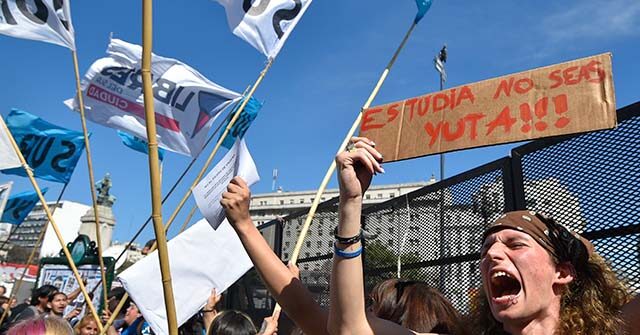On a significant legislative day in Argentina, lawmakers upheld President Javier Milei’s veto of a highly controversial university financing bill, which the government claimed threatened the nation’s fiscal stability and economic recovery endeavors. The rejection of the bill followed a vote in the lower house, where it garnered only 85 votes in favor against 159 opposed, failing to meet the necessary two-thirds requirement needed to overturn the veto. The ruling Liberty Advances party, led by Milei, does not possess a congressional majority, leading to intense backlash from leftist factions who responded to the veto with protest actions, which included calls for strikes and university takeovers. This conflict underscores the sharp political divisions in Argentina, particularly in the wake of Milei’s promises for aggressive economic overhaul.
The contested bill, previously approved by opposition members in both chambers of Congress in September, aimed to significantly boost funding for Argentina’s 60 public universities. One notable feature was the provision to adjust university budgets monthly based on inflation rates, retroactive to December 1, 2023. This proposal appeared to be a direct challenge to Milei’s administration, which took office on December 13, promoting a range of economic measures under the banner of “shock therapy.” Initially, public sentiment surrounding Milei’s agenda was understandably polarized, with critics focusing on how these measures followed a tumultuous economic period characterized by severe inflation that had plagued the country under former President Alberto Fernández’s leadership.
Milei’s decision to veto the financing bill was influenced by his firm stance on maintaining a “zero deficit.” He argued that the proposal was “irresponsible” as it lacked clarity on the funding sources for the proposed budget increases to the universities. In an official statement elucidating his position, Milei emphasized that any bill compromising the fiscal equilibrium would face his veto. He further criticized the lawmakers for engaging in what he termed “demagogic populism,” asserting that these issues should be discussed within the framework of the National Budget for 2025. The president’s remarks reflect an adamant refusal to compromise on fiscal concerns, viewing the educational funding debate as politicized.
In the backdrop of heightened tensions, the protests fanned out into violent confrontations outside Congress during the veto discussions. Leftist students and organizations clashed with police and were reported to have violently assaulted individuals associated with the Milei administration, including Franco Antunez, a libertarian activist. Antunez described his harrowing experience of being pursued and attacked by rioters, providing a stark illustration of the hostility surrounding the political discourse. His ordeal exemplifies the increasing volatility of Argentina’s socio-political landscape as supporters and detractors of Milei clash openly, leading to escalated tensions in public spaces.
The reaction from government officials further highlights the divide between the ruling party and the opposition. Martín Menem, the head of the Argentine Chamber of Deputies, condemned the now-vetoed bill as “delirium,” accusing its proponents of politicizing education issues to diminish Milei’s government. Menem framed the situation as a necessary challenge to what he describes as a longstanding pattern of fiscal irresponsibility spanning over a century. His comments, coupled with a dismissive attitude towards the motivations of protesting students, reflect an ongoing struggle between competing narratives about the role of education funding in Argentina’s economic recovery.
The conflation of educational funding with broader political strategies marks a crucial moment in Argentina’s legislative landscape as the nation navigates through intense economic challenges. The government’s effort to establish a more disciplined fiscal policy faces a significant counter-narrative from opposition groups advocating for increased investment in public education as a priority for social equity. As both sides remain entrenched in their positions, the potential for escalating unrest looms large. Moving forward, the dynamics between Milei’s administration and its critics will likely continue to shape the future of Argentina’s economic policies and educational reforms as they grapple with the legacy of financial instability and public discontent.

